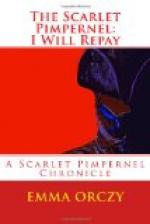CHAPTER XXI
A Jacobin orator.
Tinville alone had remained silent during Lenoir’s impassioned speech. It seemed to be his turn now to become surly. He sat picking his teeth, and staring moodily at the enthusiastic orator, who had so obviously diverted popular feeling in his own direction. And Tinville brooked popularity only for himself.
“It is easy to talk now, Citizen—er—Lenoir. Is that your name? Well, you are a comparative stranger here, Citizen Lenoir, and have not yet proved to the Republic that you can do ought else but talk.”
“If somebody did not talk, Citizen Tinville—is that your name?” rejoined Lenoir, with a sneer—“if somebody didn’t talk, nothing would get done. You all sit here, and condemn the Citizen-Deputy Merlin for being a fool, and I must say I am with you there, but...”
“Pardi! tell us your ‘but’ citizen,” said Tinville, for the coal-heaver had paused, as if trying to collect his thoughts. He had dragged a wine barrel to collect his thoughts. He had dragged a wine barrel close to the trestle table, and now sat astride upon it, facing Tinville and the group of Jacobins. The flickering tallow candle behind him threw into bold silhouette his square, massive head, crowned with its Phrygian cap, and the great breadth of his shoulders, with the shabby knitted spencer and low, turned-down collar.
He had long, thin hands, which were covered with successive coats of coal dust, and with these he constantly made weird gestures, as if in the act of gripping some live thing by the throat.
“We all know that the Deputy Deroulede is a traitor, eh?” he said, addressing the company in general.
“We do,” came with uniform assent from all those present.
“Then let us put it to the vote. The Ayes mean death, the Noes freedom.”
“Ay, ay!” came from every hoarse, parched throat; and twelve gaunt hand were lifted up demanding death for Citizen-Deputy Deroulede.
“The Ayes have it,” said Lenoir quietly, “Now all we need do is to decide how best to carry out our purpose.”
Merlin, very agreeable surprised to see public attention thus diverted from his own misdeeds, had gradually lost his surly attitude. He too dragged one of the wine barrels, which did duty for chairs, close to the trestle table, and thus the members of the nameless Jacobin club made a compact group, picturesque in its weird horror, its uncompromising, flaunting ugliness.
“I suppose,” said Tinville, who was loth to give up his position as leader of these extremists—“I suppose, Citizen Lenoir, that you are in position to furnish me with proofs of the Citizen-Deputy’s guilt?”
“If I furnish you with such proofs, Citizen Tinville,” retorted the other, “will you, as Public Prosecutor, carry the indictment through?”
“It is my duty to publicly accuse those who are traitors to the Republic.”




